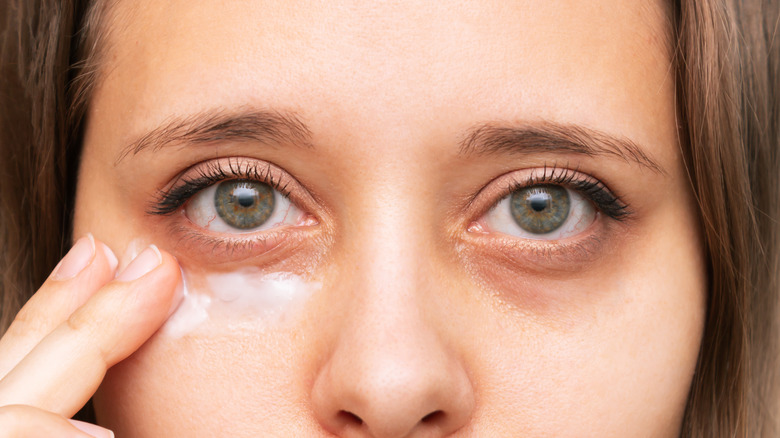What Happens To Your Eyes When You Don't Drink Enough Water
Lately, you've been feeling a little off. You're not sick, but you can't pinpoint what's happening with your body. Your eyes look tired, and you've been having trouble concentrating. It could be that you need to drink more water.
The human body is made up of 78% water, according to Cleveland Clinic. When you don't have enough because you've been forgetting to drink or you've been ill, it can lead to dehydration, which influences your overall health. Medically speaking, dehydration is when you lose more liquid than you take in, causing an imbalance in the body so it can't function normally, according to the Mayo Clinic. For example, you might notice your skin is flushed, or you're experiencing muscle cramps. Lack of water can also affect the look of your eyes and lead to eye strain. When it gets severe, you might experience headaches and blurred vision.
We'll explain more about how your eyes change when you're dehydrated. We'll also examine ways to rehydrate your eyes and prevent dehydration in the future.
Dehydration affects the look of your eyes and tears
There's a reason you wake up with dark circles and a sunken look after a night out with your friends drinking. Alcohol is good at dehydrating your body. The reason behind the sunken look is due to the layers of tissue under your eyes (per Healthline). The skin around your eyes is thin, so the moment the tissue flattens, it allows your bones to protrude a bit, giving you that Jack Skellington look. Dehydration also causes your eyes to appear darker and discolored.
However, it doesn't just stop there. Dehydration dries out the mucous membranes of your eyelids, according to Medical News Today. The lack of wetness can give your eyes a scratchy and gritty feel, which causes you to rub them to provoke a bit of lubrication. However, rubbing can just make them more irritated and red. Complete Eye Care also notes that dehydrated eyes can burn and sting and cause discomfort when wearing contacts.
Dehydration may also affect your tears. A 2021 study in Diagnostics found a link between high salt levels in tears and dehydration. While tear osmolarity is typically a test performed for dry eye disease, it could also be useful in looking for dehydration.
Vision problems from dehydration
Dry eyes are more than just annoying; they can affect your vision. A lack of lubrication can be challenging for the eyes to adjust to. Therefore, you constantly feel like something is in your eyes, or you lack the tears to flush foreign objects out. The foreign matter makes your body work harder to see, leading to eye strain, according to North Georgia Eye.
Eye strain is more commonly caused by computer screen use or driving and is due to your eye staying contracted for long periods of time, Wilmer Eye Institute ophthalmologist Esen K. Akpek, M.D. explained to Johns Hopkins Medicine. When your eyes become strained, you experience double vision, headaches, sore neck, difficulty keeping your eyes open, and sensitivity to light. Ophthalmologist Angelique J. Pillar, M.D. also noted in Oxygen Magazine that floaters and spots in vision can be common.
Eye strain isn't permanent and doesn't have long-term consequences, according to Mayo Clinic. However, it is vital to give your eyes a break. For example, North Georgia Eye recommends resting the eyes and blinking. You'll also need to remedy the underlying cause to prevent dehydration-related eye strain.
Tips to rehydrate the eye and prevent future dehydration
Once you realize dehydration is causing your problems, you must replenish the water in your system by drinking more. There isn't a cut-and-dried recommendation for how much plain water to drink. Still, the Centers for Disease Control and Prevention (CDC) do provide recommendations for fluid intake from all sources, which vary based on your sex, age, pregnancy status, and breastfeeding.
Since getting fluids running through your system can take a minute, you can relieve your eye symptoms by using dry eye treatments, according to the American Academy of Ophthalmology. To lubricate the eyes and remove debris, try using artificial tears like Visine. You can also use a warm compress to help give your skin and eyes moisture from the outside in. Giving your eyes a massage and allowing them to rest for several minutes can also help to lubricate them and remove any collected waste.
To prevent dry eyes and dehydration in the future, the CDC recommends taking the initiative by carrying a water bottle around with you. It's also beneficial to eat superfoods high in water content, like spinach and cucumbers. Serving water with meals also helps to ensure that you're meeting your daily requirements. It's also beneficial to avoid dehydrating drinks like caffeine, sugary beverages, and alcohol.




